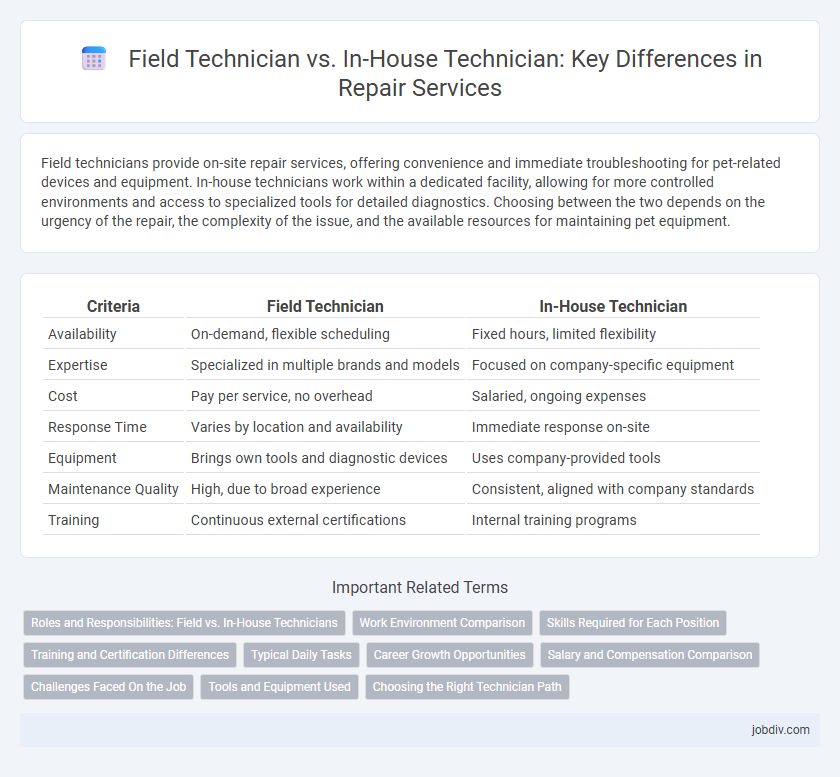Field technicians provide on-site repair services, offering convenience and immediate troubleshooting for pet-related devices and equipment. In-house technicians work within a dedicated facility, allowing for more controlled environments and access to specialized tools for detailed diagnostics. Choosing between the two depends on the urgency of the repair, the complexity of the issue, and the available resources for maintaining pet equipment.
Table of Comparison
| Criteria | Field Technician | In-House Technician |
|---|---|---|
| Availability | On-demand, flexible scheduling | Fixed hours, limited flexibility |
| Expertise | Specialized in multiple brands and models | Focused on company-specific equipment |
| Cost | Pay per service, no overhead | Salaried, ongoing expenses |
| Response Time | Varies by location and availability | Immediate response on-site |
| Equipment | Brings own tools and diagnostic devices | Uses company-provided tools |
| Maintenance Quality | High, due to broad experience | Consistent, aligned with company standards |
| Training | Continuous external certifications | Internal training programs |
Roles and Responsibilities: Field vs. In-House Technicians
Field technicians specialize in on-site repairs, installations, and maintenance, handling diverse environments with tools and diagnostic equipment while ensuring minimal downtime for clients. In-house technicians focus on troubleshooting, repairing, and maintaining equipment within a controlled workspace, often managing complex systems and collaborating closely with engineering teams. The distinct roles emphasize field technicians' adaptability and customer interaction, contrasted with in-house technicians' technical depth and support capabilities.
Work Environment Comparison
Field technicians operate in diverse environments, often encountering variable weather, remote locations, and on-site challenges requiring adaptability and problem-solving skills. In-house technicians work within controlled, consistent settings, enabling access to specialized tools and immediate team support for efficient troubleshooting. The choice between field and in-house technicians impacts workflow flexibility, resource availability, and response times in repair operations.
Skills Required for Each Position
Field technicians require strong diagnostic skills, adaptability, and proficiency in mobile technology to address diverse repair issues on-site across various environments. In-house technicians need specialized knowledge of specific equipment, advanced troubleshooting abilities, and collaboration skills for working within a controlled workshop setting. Both roles demand a solid foundation in electrical and mechanical repair principles, with field technicians emphasizing problem-solving under variable conditions and in-house technicians focusing on precision and systemic maintenance.
Training and Certification Differences
Field technicians typically require extensive training in on-site diagnostic tools and customer interaction, emphasizing adaptability to various environments and equipment. In-house technicians prioritize certifications related to specific machinery and controlled repair processes, often receiving continuous education on the latest technological updates within the company. Certification standards for field technicians often include OSHA safety and remote troubleshooting credentials, while in-house technicians focus on manufacturer-specific training and quality assurance certifications.
Typical Daily Tasks
Field technicians typically perform on-site repairs, installations, and maintenance, often troubleshooting equipment at client locations to ensure system functionality. In-house technicians generally handle diagnostics, preventive maintenance, and equipment calibration within a controlled environment, facilitating faster access to tools and parts. Both roles require expertise in handling technical repairs but differ significantly in mobility and workspace conditions.
Career Growth Opportunities
Field technicians gain diverse experience by working in varied environments and handling on-site challenges, which accelerates skill development and adaptability. In-house technicians often benefit from structured training programs and closer collaboration with specialized teams, fostering deep technical expertise. Career growth for field technicians may lead to project management or specialized industry roles, while in-house technicians frequently advance through technical leadership or managerial positions within the company.
Salary and Compensation Comparison
Field technicians typically earn a higher hourly wage compared to in-house technicians due to travel demands and variable work environments, with average salaries ranging from $45,000 to $65,000 annually. In-house technicians receive more consistent compensation packages, often including benefits such as health insurance, paid leave, and overtime pay, contributing to a total salary package between $40,000 and $60,000 per year. Bonus structures and reimbursement for travel expenses commonly enhance field technicians' overall earnings, while in-house roles emphasize job stability and fixed schedules.
Challenges Faced On the Job
Field technicians face challenges such as unpredictable environments, travel time, and limited access to tools and parts, which can delay repairs and increase downtime. In-house technicians encounter difficulties including restricted workspace, constant supervision, and pressure to quickly resolve issues within company protocols. Both roles require strong problem-solving skills but differ significantly in operational constraints and resource availability.
Tools and Equipment Used
Field technicians rely on portable diagnostic tools, handheld devices, and mobile toolkits designed for on-site repairs, enabling quick troubleshooting and adaptability to various environments. In-house technicians utilize more extensive, stationary equipment such as centralized diagnostic machines, specialized repair benches, and calibration devices, allowing for detailed inspections and precise adjustments within the controlled workshop setting. The choice of tools directly impacts repair efficiency, with field technicians prioritizing mobility and versatility, while in-house technicians emphasize comprehensive capabilities and precision.
Choosing the Right Technician Path
Choosing the right technician path depends on specific repair needs, budget constraints, and response time requirements. Field technicians offer on-site diagnostics and repairs, ideal for urgent or location-specific issues, while in-house technicians provide continuous support and deeper system familiarity, beneficial for ongoing maintenance. Evaluating factors like travel time, expertise scope, and cost efficiency ensures optimal decision-making between field and in-house technician solutions.
Field Technician vs In-House Technician Infographic

 jobdiv.com
jobdiv.com